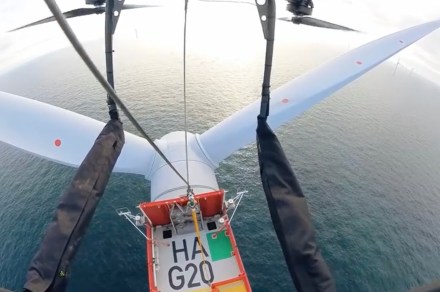

When you think of drone delivery, you probably imagine a mid-sized drone carrying a coffee or a small snack to a customer waiting outside their home in a residential area. What you won’t think of is a large, pilotless, multi-rotor machine carrying cargo over choppy waters to a massive wind turbine.
But that’s exactly what energy firm Ørsted has started doing in the North Sea off the east coast of the U.K.
In what it claims is a world first, Ørsted is currently trialling flights of the 128-pound (58-kilogram) drones for cargo drops to wind turbines.
The company describes the drone as having “the equivalent weight of a large baby giraffe, with the wingspan of an albatross.” It’s operated by drone specialist Skylift and you can see it in action in the video below:
Using drones to drop off cargo helps Ørsted to reduce costs and save time while also improving safety. The flying machines have eight sets of rotors in a quadcopter configuration and are operated from existing crew transfer vessels and service vessels that are already on site, so extra sailings just for the drones aren’t necessary.
“Drones mean less work disturbance as turbines don’t have to be shut down when cargo is delivered,” Ørsted said in a release. “They avoid risk, making it safer for personnel working on the wind farm and minimize the need for multiple journeys by ship, reducing carbon emissions and climate change impacts.”
The company has already tested smaller drones but recently moved onto larger machines capable of carrying heavier payloads.
Mikkel Haugaard Windolf, who is heading the project for Ørsted’s offshore logistics team, said he believes the U.K. could become the first country to commercialize this system in offshore wind farms.
Flying over water gives drone operators greater freedom to deploy larger machines and carry heavier objects as many restrictions still apply when it comes to drone flights over people and buildings.
Amazon, Wing, and UPS are among a number of firms looking to use drones for package delivery to customers, but strict regulations have slowed progress toward the rollout of a widely used platform.
Still, as drones advance, it’s fascinating to see how different industries are gradually turning to the technology in a bid to make their work more safer and more efficient.
Editors’ Recommendations






